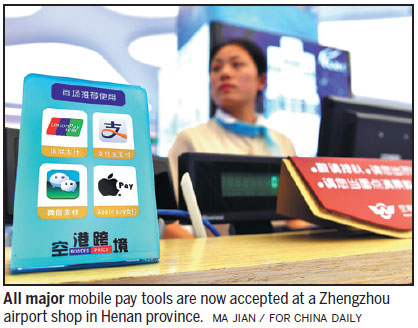QR-vs-NFC game enlivens market

The competition in China's multibillion-dollar mobile payment market has intensified with Apple Inc stepping up efforts to challenge the dominance of Alibaba Group Holding Ltd and Tencent Holdings Ltd.
The US tech giant launched a large-scale promotion campaign for its mobile payment service Apple Pay earlier this month, in the hope of luring more technology-responsive consumers away from Alibaba's Alipay and Tencent's WeChat Pay.
Unlike the two Chinese homegrown services which can be installed in all kinds of mobile devices, Apple Pay is only available for iPhone users. But Apple Pay appears to enjoy an advantage in its use of near field communication or NFC technology, which uses a chipset embedded in smartphones.
NFC technology allows contactless data exchange between devices and point-of-sale or POS terminals. The transaction is completed when users hold their phones near a POS portal. It is more convenient than Alipay and WeChat Pay, which are initiated by scanning a quick response or QR code, market people said.
But the key question is whether such convenience is recognized by consumers.
As part of its broader push to win more first-time users for its payment service, Apple partnered with both online and offline retailers to launch the promotion campaign.
From July 18 to 24, Apple Pay users in China who went shopping at certain retailers and supermarkets received benefits like huge discount offers and additional reward points.
The promotion involved 28 offline retail stores, supermarkets and restaurants such as Starbucks and Costa Coffee, as well as 16 internet merchants, including bike-sharing app Mobike, online travel app Ctrip and e-commerce site JD.
Jennifer Bailey, vice-president of Apple Pay, told financial content provider Caixin that the promotion came as the payment tool is expanding its scale and partnership with local banks.
According to Bailey, 97 percent of the Apple Pay users in China are very satisfied with the service and the company aims to encourage every iPhone user to opt for Apple Pay.
The promotion evoked a mixed response in China. At a Beijing branch of Burger King, a US-based fast-food chain, when a poster materialized announcing that customers can receive a 50-percent discount by using Apple Pay, only two of the 14 customers who paid bills in the next few minutes availed of the offer. Eight of them used Alipay or Wechat Pay, three used bank cards and one paid by cash.
In the first quarter of 2017, China's third-party mobile payment market saw transactions worth 18.8 trillion yuan ($2.78 trillion), up almost 47 percent year-on-year, according to Beijing-based research agency Analysys.
Alipay and WeChat Pay commanded market shares of nearly 54 percent and 40 percent respectively.
Li Chao, an analyst at iResearch Consulting Group, said NFC-based payment services still have a very limited presence in China. Consumers have been long accustomed to QR code-based payments
Li said huge resources and big efforts will be required to change consumer habits and preferences. "The (Apple Pay) promotion may be effective in the short term. But in the long term, Apple needs to come up with more services to differentiate itself from its rivals."
























